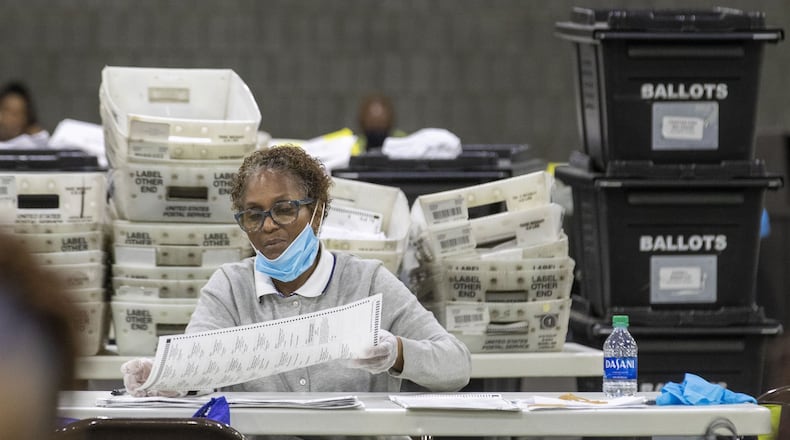The largest early voting site in Georgia — and perhaps the entire country — will sit in the heart of Fulton County at the State Farm Arena for the August runoff and November presidential elections.
The Atlanta Hawks’ organization is donating the team’s 21,000-seat home, along with hundreds of hours of staff members’ time, to Fulton County voters in an effort to ensure as many people as possible can vote in the upcoming elections, the team said Monday.
Early voting in the runoff begins July 20.
The county elections board on Monday approved using the arena, along with 11 other new early voting sites, in hopes of rectifying a series of historic blunders that created long lines in sweltering heat in the June 9th primary election.
The debacle — the result of precinct closures, voting machine problems and complications stemming from the coronavirus pandemic — saw many people give up their right to vote out of frustration. It also led to proposed legislation to dismantle the Fulton County elections board that passed in the Georgia House of Representatives but failed to come up for a vote in the Senate.
Fulton County Commission Board Chairman Robb Pitts said during a virtual press conference Monday that he didn't believe Fulton County voters experienced the worst of the state's Election Day problems, but acknowledged that the perspective was widely shared.
“We will go from the proverbial worst to the first as a result of this collaboration,” Pitts said.
Mary Carole Cooney, chair of the Fulton County election board, said the 700,000 square-foot arena would provide the space for additional voting machines and for the board to comply with social distancing guidelines because of the COVID-19 pandemic.
Hawks’ CEO Steve Koonin said the team would have their Information Technology staff on hand to help resolve any technical issues that might arise.
Koonin the idea to use the team’s facility partly came about as a result of the recent social unrest over the death of Georgia Floyd at the hands of a Minneapolis police officer.
“We are more than a basketball team,” Koonin said. “When I was watching the protests, they took place at the intersection of Centennial Olympic Park Drive and Marietta, which is our address. It struck me that if nothing came out of these protests to create change, then we would have failed.
“I thought the most accessible change was getting more people to vote.”
State Rep. Josh McLaurin, D-Sandy Springs, who proposed taking away the power to appoint election board members from county commissioners and giving it to the Fulton house delegation, said the Hawks commitment was encouraging. But he said he didn’t think it negated the need for the legislation he introduced.
“We will know what worked by Nov. 3,” McLaurin said.
The problems with the June 9 election became evident in early voting. State and county officials had encourage voters to cast absentee ballots and avoid showing up at the polls during the COVID-19 pandemic.
But a backlog of 25,000 absentee ballot applications got stuck in county computer server. The lack of ballots caused massive uncertainty among voters, who then showed up at a reduced number of polling sites where workers were overseeing new equipment on which they had not been adequately trained.
Adding to those complications were social distancing and sanitation requirements at the polls.
During early voting in the next two elections, any Fulton County resident can vote at the arena, but not on election day.
Koonin said during the press conference that the Hawks had consulted with the Harvard Election Data Archive and that the organization could not identify a larger polling site anywhere in the country.
“We don’t have 1,000 percent verification,” Koonin said. “But after studying it over the weekend, we could not find any place of this size and scale.”
About the Author
Keep Reading
The Latest
Featured



